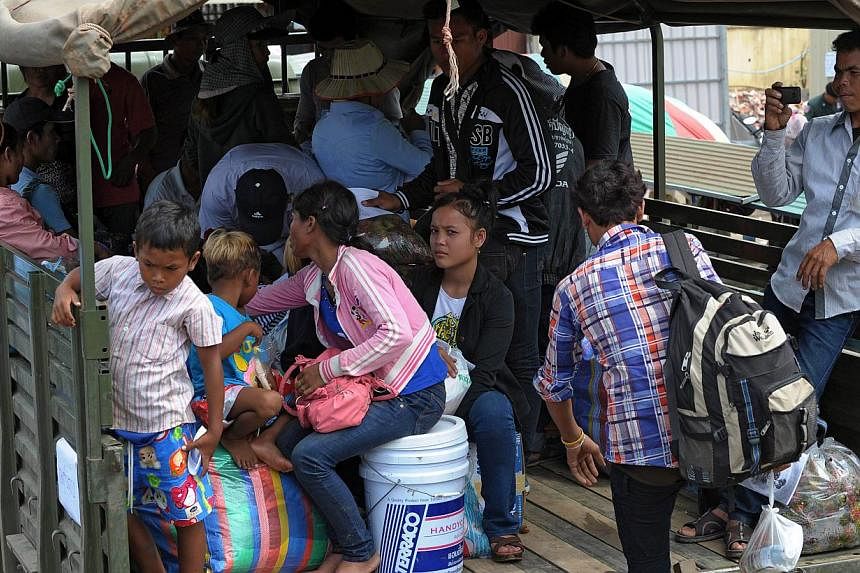POIPET, Cambodia (AFP) - The number of Cambodian labourers fleeing Thailand soared to 220,000 on Wednesday, authorities said, as Phnom Penh accused Thailand's new military rulers of sparking the flight of migrant workers.
Panicking Cambodians - who help keep major Thai industries afloat but often lack official work permits - have streamed across the border since the junta warned last week that illegal foreign workers face arrest and deportation.
At a meeting in Bangkok Tuesday, Cambodia's ambassador and a top Thailand foreign ministry official agreed to end "rumours" of a crackdown and set up a hotline on labour issues.
But Cambodian Interior Minister Sar Kheng later placed blame for the crisis squarely at Bangkok's door, claiming the junta had caused at least eight deaths and economic hardship for both countries.
"The total number of Cambodians who have returned from Thailand between June 6 and 18 is 220,000 across the different checkpoints between the two countries," Pich Vanna, chief of the Cambodia-Thai Border Relations Office, told AFP on Wednesday.
At the main border crossing in Poipet - a bustling, seedy frontier town home to large casinos and hotels - around 3,000 Cambodian migrants arrived in Thai military trucks and police cars by Wednesday afternoon.
The junta which took power last month has insisted there is no crackdown and tried to calm the panic that has seen the exodus of what could be, by some estimates, the entire undocumented Cambodian population in Thailand.
On Tuesday Cambodian Ambassador Eat Sophea dismissed rumours of the shooting and abuse of Cambodian migrants by Thai authorities - among the factors believed to have triggered the mass departures.
But Sar Kheng, who is also Cambodia's deputy prime minister, said the Thai junta had deported them and urged them to take responsibility for the upheaval.
"I think that the current leaders of Thai junta must be held accountable for what has happened," he said in Phnom Penh, adding that eight people had been killed in traffic accidents linked to the exodus.
Sar Kheng said Cambodian migrants had helped boost the Thai economy, which is the second-largest in Southeast Asia and draws large numbers of migrants from its neighbours.
"According to my informal information, (Thai) employers have started to protest against the issue," he added.
Kor Sam Saroeut, governor of Cambodia's northwestern province of Banteay Meanchey where the Poipet checkpoint is based, said the number of migrants returning home was down compared with previous days, but he still expected more to arrive.
"The fear among them has not faded away. That's why they keep returning to Cambodia," he said.
Arriving back on home soil Wednesday Kot Sok, 21, said rumours had triggered the flight.
"I heard that the Thai military will arrest Cambodians. Six friends and I have come back because we were scared of being arrested," he said.
The border relations official Pich Vanna said some of the returnees had been rounded up by authorities in Thailand.
"Some Cambodian migrants were rounded up from construction sites and put in trucks to Cambodia," he said.
Thailand's military regime has strongly denied it has forced Cambodian labourers out of the country and dismissed reports of killings as "groundless".
Since last week's threat to arrest and deport all illegal foreign workers, the Thai foreign ministry has stressed the "great importance" of the role that migrant workers play in the economy.
There has been no comparable exodus reported on Thailand's borders with Myanmar or Laos, neighbouring countries whose migrant workers also fill many of the kingdom's manual labour vacancies.
This has led some analysts to suggest the Cambodian exodus may be linked to the sensitive nature of diplomatic relations between Thailand and Cambodia.
The coup in Thailand on May 22 followed years of political divisions between a military-backed royalist establishment and the family - and supporters - of billionaire former Thai prime minister Thaksin Shinawatra.

